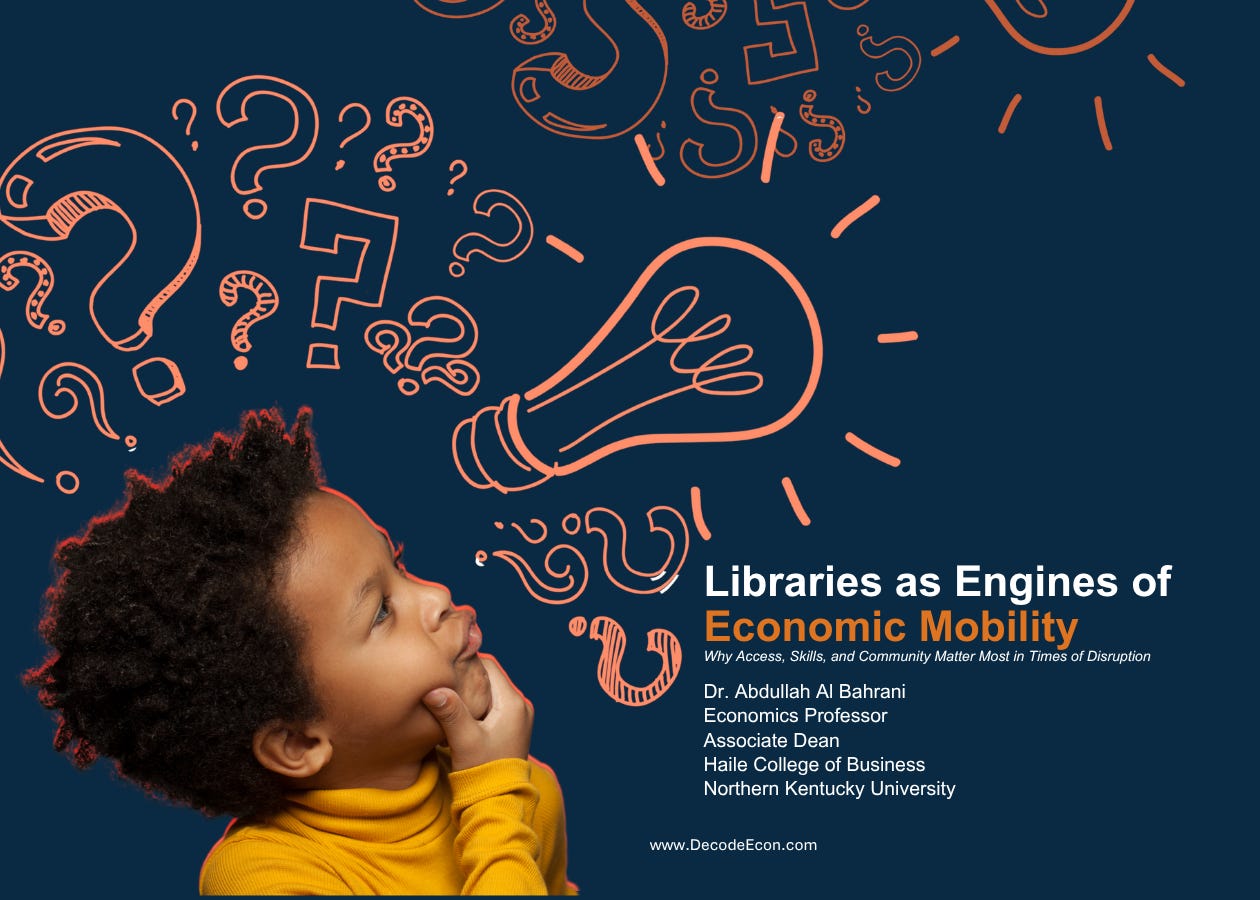Libraries as Engines of Economic Mobility
A Decode Econ Special Edition
I had the honor of speaking at Kenton County Public Library’s Staff Day—a gathering of the people who keep one of the most critical public institutions running. My talk focused on the economic forces reshaping opportunity in America and the powerful role libraries play in supporting communities through moments of disruption. Today’s newsletter is a written summary of that conversation, expanded and adapted for the Decode Econ audience. If you couldn’t be in the room, this will walk you through the heart of the message: why libraries matter now more than ever.
The economy looks strong—until you try to live in it. Job creation is slowing, early-career layoffs are climbing, and consumer sentiment feels like it’s stuck in a recession that hasn’t technically arrived. We’re watching a K-shaped economy unfold in real time. Asset owners are doing just fine. Low-income families are absorbing the shocks. And young professionals, in particular, are caught in the crosswinds of an AI-disrupted labor market that keeps pulling the bottom rungs off the career ladder.
For decades, early-career jobs taught young people the competencies employers value most: communication, leadership, initiative, decision-making, and emotional intelligence. Today, those jobs are disappearing just as quickly as they can be automated. We’ve created a world where students believe they’re prepared, employers insist they’re not, and both sides feel increasingly frustrated. Economic uncertainty has a way of exposing structural cracks, and right now we’re seeing them widen.
But there’s one institution that becomes more important when the world feels unstable: libraries. And not in a nostalgic, “isn’t that nice” kind of way. In a real economic-infrastructure sort of way.
Economists talk about frictions: anything that makes it harder for people to participate in the economy. Libraries quietly eliminate those frictions every single day. They remove cost and access barriers. They bridge knowledge gaps. They provide the kind of social capital that people without networks often struggle to access. A library card remains one of the most powerful equalizers we have because it opens the door to opportunity without requiring income, connections, or credentials.
Libraries also thrive in uncertainty. As public trust in institutions declines, libraries remain accessible, non-commercial, community-rooted, and free—four qualities that become invaluable during periods of economic stress. They are one of the few places where people can learn, experiment, build skills, and ask questions without judgment. And in an era when AI is removing traditional learning pathways, libraries are stepping into a new role: competency builders. They’re doing it through makerspaces, entrepreneurial programming, collaborative learning environments, career support, and community-centered skill development. What many young professionals have lost in the labor market, libraries are quietly helping them rebuild.
For me, this isn’t theoretical. I grew up in Louisville, Kentucky—one block from the Main Library. It was my after-school home, my quiet space, my curiosity lab. That building gave me access I didn’t have anywhere else, a safe place to explore ideas, and the freedom to imagine a different future. It shaped how I learned, how I think about the economy, and the work I do today. A library was my launchpad.
And that’s exactly what so many young people need right now: a launchpad.
Economic disruption is reshaping opportunity in America, and the earliest-career workers are the ones absorbing the impact. Women are shifting into self-employment at historic rates. College graduates are entering a labor market defined by volatility. The competency gap is widening. The vibes, economically speaking, are not great.
But this is precisely where libraries show their quiet power. They support learning. They support skilling. They support entrepreneurship. They support economic mobility. They do all of this with no paywall, no gatekeeping, and no prerequisites besides curiosity.
If we care about economic mobility, we have to care about libraries. They remain one of the most stable, equitable, and opportunity-creating institutions we have left—and in moments of uncertainty, that role becomes essential.
Here are my slides from the talk:



Thank you for the slides!